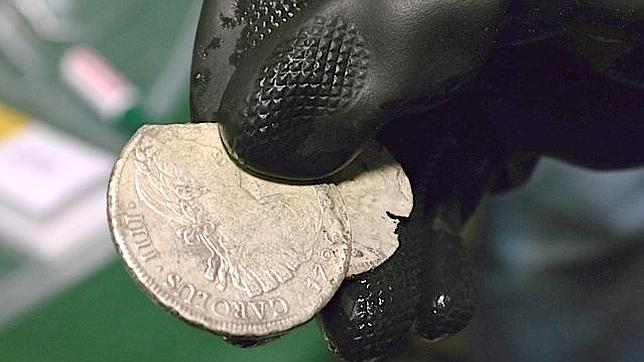Check out the First Coast News Report by Clicking the Video Above. The embedded video has been giving us problems, so if you cannot see it above click here to go directly to the First Coast News story and video
[UPDATED: As of Thursday, February 23, 2012, Spain has taken custody of the coins and other artifacts salvaged from the Spanish warship Mercedes wreck site from treasure hunting firm Odyssey in Tampa, Florida. Click here for English translation. Click here for Original Story in Spanish.]
[UPDATED: On Friday, February 24, at 12:30, the planes departed the U.S. with the coins and other artifacts on board, bound for their original 1804 destination, Spain. Click here for the story.]
Yesterday we received a call from Jessica Clark, First Coast News TV reporter, asking us how we felt about the recent court ruling regarding the treasure hunting company, Odyssey Marine, who had salvaged some 17 tons of silver coins from the 1804 wreck of the Spanish frigate Nuestra Señora de las Mercedes. This was a controversial action, as Odyssey is a commercial treasure hunting company who does not operate to internationally accepted archaeological standards. Spain had pressed in U.S. courts for the return of all recovered objects, insisting that as a Spanish military vessel a salvor had no legal right to take anything from the Mercedes without prior approval from the Spanish government, and a Federal Judge agreed with them. What’s more, the U.S. Supreme Court has declined to hear Odyssey’s appeal, so the ruling is final, and Spain’s cultural property must be returned to them, where it will not be sold but will go on display in one or more museums. As I write this, Spain is preparing to send a fleet of military aircraft to Tampa to repatriate the coins.
Click on the above video embed to see the First Coast News story, or click here to read the written version and check out a slideshow of artifacts recovered from our ongoing excavation of the Storm Wreck.

One of Odyssey’s salvage vessels, the Odyssey Explorer.
We here at LAMP have blogged before regarding our opinion on treasure hunting (here and here and here, for example), and of course it should be no surprise that responsible, professional archaeologists are against the practice of commercial treasure hunting. Probably the primary concern is that treasure hunters sell the artifacts they collect, as opposed to archaeologists who consider artifacts recovered from an archaeological context to be critical pieces of evidence to past human behavior, which must be kept in an intact collection accessible to interested members of the public and other scholars. Imagine if crime scene investigators had to sell off the physical evidence they collected in order to pay for an investigation–how many cold cases would be solved years down the road? Additionally, treasure hunters, whose bottom line depends on how fast they can recover as much valuable material as possible, regularly “cut corners” in the field to meet the bottom line. In other words, their recovery techniques are not up to the highest scientific standards practiced by archaeologists, resulting in a loss of knowledge that might otherwise be recovered. Likewise treasure hunters have a poor record in producing reports or publications to inform archaeologists or the public the results of their work, and they usually work in a cloud of secrecy to guard against legal actions. It is also easy to see how treasure hunters or the archaeologists willing to eschew professional ethics and work with them can be biased in their interpretations of a site–there are monetary incentives to interpret the identity of a site in a way that will attract investors, or to bolster a case in court. For example, Odyssey attempted to argue in the recent series of courtroom cases that the wreck in question was not that of Mercedes, because if the wreck was a privately-owned vessel it would have shot a hole in Spain’s case. But the evidence collected was clear enough for the judge, who said that Odyssey had set out to find the Mercedes and had clearly done so:
The judge argued that the coins, all dated prior to 1804, matched the Mercedes’ haul of mainly silver coins minted in Lima – part of a haul being brought back to finance Spain’s European wars. He also said cannon found there matched those on board the Mercedes.
“The debris field’s location, coins, cannons, and artefacts persuasively match the Mercedes’s historical record,” the judge said.
“That Odyssey, which set out to discover the Mercedes, found this mix strewn about in an area a few football fields square where the vessel met its explosive ending makes the conclusion even more compelling.”
Click here to read the 2009 court records quoted from above.
As the First Coast story mentions, with all of the shipwrecks off the waters of St. Augustine, our nation’s oldest port, it is quite possible that LAMP archaeologists might one day discover another Spanish military-owned vessel. It is unlikely, however, that Spain would move to prevent us from a legitimate archaeological excavation of one of their wrecks, however. While Spain has objected to this commercial, non-scientific venture at one of their wrecks, which is after all a military grave site, the legal concept of “sovereign immunity” has never been used to permanently stop an archaeological excavation. There are several examples of this. When French archaeologists discovered and began to excavate the remains of the Confederate raider CSS Alabama, the U.S. State Department temporarily stopped the excavation, until an agreement was worked out for a joint French-American team to work on the wreck, which as a Confederate naval vessel is now property of the U.S. Navy. Likewise, in Texas when a team of U.S. archaeologists were working on the wreck of the French naval vessel la Belle, an agreement was brokered between the French and the U.S. whereby France remained legal possession of all recovered artifacts, but the state of Texas was to act as their steward in perpetuity. And finally, two Spanish military vessels dating to 1559 in Pensacola Bay have been excavated by University of West Florida, with the formal blessing of the government of Spain. UWF even hosted a visit by the King and Queen of Spain to see the ongoing excavations and museum exhibit.
So we do not anticipate any negative impact on our own work from this ruling, and are pleased to see that in this case the treasure hunter did not get away with looting a shipwreck. The only tragedy is that the damage is already done, and the knowledge that has been lost due to salvage by treasure hunters rather than careful archaeological excavation cannot be ascertained. It is also welcome news that Spain has declared the coins an important part of their national heritage, and that they will not be sold off despite the disastrous state of the Spanish economy, which would have made a very lamentable precedent.

More than 595,000 silver coins taken from the wreck Mercedes were confiscated by Spanish authorities on February 23, 2012.

